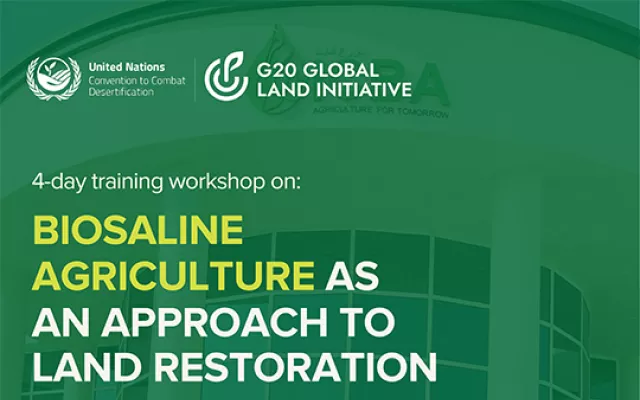New project to study treated sewage effluent’s potential for food, water security in UAE
19 September 2021
The capacity of treated sewage effluent (TSE) to be a key enhancer of the nation’s food security was explored at a workshop held yesterday, with the activity outlining a specialist research project that is being conducted in the UAE.
Undertaken by four main partners - the UAE-based International Center for Biosaline Agriculture (ICBA); the International Center for Agricultural Research in the Dry Areas (ICARDA); the United Arab Emirates University (UAEU); and the Food and Agriculture Organization of the United Nations (FAO) - the science project that was the focus of the workshop will evaluate how the country’s growing landscape of advanced farming within protected agriculture systems initiatives - such as indoor greenhouses and vertical farms - can benefit from using TSE and biosolids, much of which is currently wasted.
Attending the virtual workshop, H.E. Mariam bint Mohammed Almheiri, UAE Minister of State for Food and Water Security, said that it represented a significant step in evaluating novel methods in a multidisciplinary approach towards enhancing food security, through adopting an approach to developing government policies based on research, development and scientific evidence.
“The UAE’s annual water demand amounts to around 5 billion cubic metres, with treated sewage effluent accounting for about 11% of this demand. We produce around 735 million cubic metres of TSE each year, but more than a quarter of this resource is either lost or discharged into the sea. This is a tremendous waste, as TSE is rich in nutrients, making it an ideal medium to support crop growth,” said Her Excellency.
“It’s the same situation with biosolids. Annually, the UAE produces about 167,000 tons of biosolids, of which a large amount is wasted. This is another missed opportunity when you consider that treated biosolids can be used to fertilise crops grown in CEA farms, thereby negating the need to use artificial fertilisers and chemical growth products,” Her Excellency added.
“Both TSE and biosolids are valuable resources and shouldn’t be wasted. By utilising TSE in particular in our agricultural sector – specifically in Controlled Environment Agriculture systems - we can increase our agricultural yield and the amount of food produced in the country without the need to consume our water resources. This will enable us to achieve better rates of food self-sufficiency, which will play an important role in enhancing both food and water security,” Her Excellency continued.
The scientific project is significant because the UAE has one of the world’s highest per capita water usages. The agricultural sector is responsible for the lions’ share of the UAE’s water consumption, as it consumes about 83% of the total water demand compared to its domestic and industrial sectors.
Enhancing controlled environment agriculture is one way the UAE is cutting down on its water demand, as it enables crop growing using up to 95% less water than traditional agricultural methods. CEA represents a main plank of the UAE’s National Food Security Strategy 2051, which aims to ramp up the country’s ability to produce food sustainably using technology-enabled methods.
As a result of the National Food Security Strategy efforts, the UAE is now home to a dynamic, vibrant and modern agricultural sector, the latest addition being the Food Tech Valley. Launched earlier this year, the food hub aims to double the UAE’s food production through modern agriculture systems that adopt and implement the latest technology across the food value chain.
Her Excellency concluded that reusing TSE within CEA farms would enable the UAE to improve the way it uses resources through combining two synergistic efficiencies, with CEA farms providing a reduced demand for water, and this reduced demand being met by supplies that are sustainable.
In addition to Her Excellency, the virtual workshop was attended by representatives from various federal government bodies, local authorities, private-sector stakeholders, non-profit organizations and international institutions.










